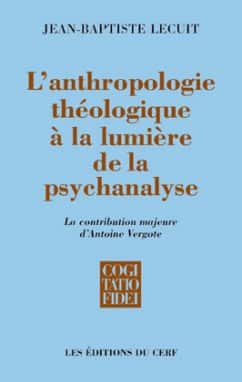
Collection “Cogitatio Fidei”, Editions du Cerf, 2007
Theological Anthropology in the Light of Psychoanalysis
The relationship between faith and psychoanalysis has long been a subject of intense scrutiny. Rejection of one by the other alternates with mutual fascination. At first glance, things should be simple for a theologian; he will consider that faith and psychoanalysis have the same focus: Man. Psychoanalytic concepts and tools should therefore be useful, particularly in the field of theological anthropology. Such a perspective, of course, skirts the main issue. For Freud, man is certainly not created by God, as maintained by faith. More importantly, for Freud, man is unconsciously the creator of God and his relationship with God is no more than an illusion, an expression of his own desire. Therein lays the ultimate challenge of psychoanalysis to faith, a challenge Jean-Baptiste Lecuit intends to meet.
He therefore conducts two tasks concomitantly. On the one hand, he puts theological anthropology under the scrutiny of Psychoanalysis. And, in doing so, he will show the immense contribution to this endeavor by Antoon Vergote, theologian, psychoanalyst and psychologist of religion. His works illustrate perfectly how the understanding of faith can be enlightened by psychoanalysis, theory and practice.
The relevance of Antoon Vergote’s works to our study is due both to the variety of related subjects he has covered and to the quality of his contributions. He has, of course, investigated the inescapable importance of the psychic, particularly the issues related to the Oedipus complex. He has also contributed to the dialogue between faith and culture today. In a world where the concepts of fatherhood and law are being challenged, he has shown their relevance. In the interfaith dialogue, he has brought out the specificity and core values of the Christian faith. In other contributions, he has highlighted how the Christian faith is both profoundly human and transcendental; a challenge in a world where both dimensions are contested as never before. The relevance of his contributions is enhanced by the manner in which he conducts the dialogue between faith and psychoanalysis. He does not fall into the usual traps of such a dialogue, reductionism or dualism; excessive psychoanalysis or excessive spirituality.
